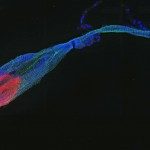Link to Pubmed [PMID] – 10450422
Trans. R. Soc. Trop. Med. Hyg. 1999 Feb;93 Suppl 1:21-8
To investigate the impact of transmission on the development of immunity to malaria and on parasite diversity, longitudinal surveys have been conducted for several years in Dielmo and Ndiop, 2 neighbouring Senegalese villages with holo- and mesoendemic transmission conditions, respectively. We analysed Plasmodium falciparum msp1 block 2 and msp2 genotypes of isolates collected from 58% of the Dielmo villagers during the same week as those studied recently from Ndiop. Allele frequencies differed in both villages, indicating considerable microgeographical heterogeneity of parasite populations. The complexity of the infections, estimated using individual or combined msp1 and msp2 genotyping, in Dielmo was more than double that in Ndiop and it was age-dependent in Dielmo but not in Ndiop. Thus, this study confirmed the influence of age on the complexity of asymptomatic malaria infections in a holoendemic area. The age distribution of complexity in Dielmo substantiates the interpretation that the number of parasite types per isolate reflects acquired antiparasite immunity. This cross-sectional survey also confirms that the sickle cell trait has no impact on complexity but influences the distribution of P. falciparum genotypes.

